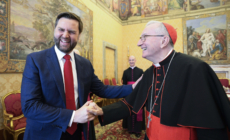-
How to Watch Clippers vs. Nuggets: Live Stream NBA Playoffs, TV Channel - 38 mins ago
-
Protesters Nationwide Rally Again to Condemn Trump Policies - 47 mins ago
-
How to Watch HFX Wanderers FC vs Pacific FC: Live Stream Canadian Premier League, TV Channel - about 1 hour ago
-
What to Know About Mark Carney and Pierre Poilievre, Battling to Become Canada’s Next Leader - 2 hours ago
-
Poker Face Season 2 Release Date, Schedule, Where To Watch - 2 hours ago
-
What I Didn’t Know About the Chicken Egg Industry Horrified Me - 2 hours ago
-
JD Vance Has ‘Exchange of Opinions’ With Top Vatican Official - 2 hours ago
-
Bucks vs Pacers: Damian Lillard Receives Major Injury Update - 3 hours ago
-
Former Trump Staff Members Liken His Actions to Those of ‘Royal Despot’ - 3 hours ago
-
How to Watch Aston Villa vs. Newcastle: Live Stream Premier League, TV Channel - 4 hours ago
California will try to maintain global trade despite Trump tariffs, Newsom says

Gov. Gavin Newsom announced Friday that California will look for ways to expand trade and persuade international partners to exempt the state from global payback as President Trump’s sweeping round of tariffs have sent U.S. and global financial markets tumbling.
“Donald Trump’s tariffs do not represent all Americans,” Newsom said in a video posted Friday on the social media platform X. The 40 million residents of California, he said, live in “the tent pole of the US economy” that represents 14% of the nation’s GDP and is the fifth largest economy in the world.
Newsom said he had directed his administration to “look at new opportunities to expand trade and “to remind our trading partners around the globe that California remains a stable partner.”
California is a major trading partner globally, and tariffs could adversely impact many sectors of the state’s economy, from the tech industry to agriculture and the ports. But it’s unclear exactly how Newsom’s efforts to carve out exemptions would work or whether a state can forge such exceptions.
Newsom’s office said in a news release that it would work to pursue “collaborative opportunities with trading partners” that protect California’s economic interests — workers, manufacturers, and businesses — and the broader supply chains linked to the state’s economy. The administration will explore ways to “support job creation and innovation in industries reliant on cross-border trade, promote economic stability for businesses and workers impacted by federal trade disruptions [and] safeguard access to critical supplies, such as construction materials needed for recovery efforts following the devastating Los Angeles firestorms.”
Kush Desai, a White House spokesman, responded by saying “Gavin Newsom should focus on out-of-control homelessness, crime, regulations, and unaffordability in California instead of trying his hand at international dealmaking.”
Stock markets worldwide careened even lower Friday after China matched President Trump’s significant raise in tariffs in an escalating trade war. There were growing concerns over sharply rising prices that will hit consumer pocketbooks.
On Thursday, stocks plummeted, with the S&P 500, Dow Jones industrial average and Nasdaq Composite all reaching their lowest one-day drops since the economy tanked at the outset of the COVID-19 pandemic in 2020.
The tariff hit some of California’s top trading partners.
The tariffs include additional duties of 24% on Japan, 25% on South Korea and a 34% tariff on China, on top of a 20% tariff that Trump imposed on that nation over illegal imports of the deadly drug fentanyl.
Canada and Mexico were excluded from both the baseline and “reciprocal” tariffs, which could ease the effect at the grocery store. Most U.S. produce imports come from Mexico and Canada, including avocados, cucumbers and mushrooms.
But the countries still face 25% levies on certain goods and 25% tariffs on imported cars and light trucks. Car buyers across South California scrambled this week to make purchases ahead of the tariffs.
“It’s going to have a huge, huge impact on manufacturing and supply chains throughout throughout California.,” economist Kevin Klowden of the Milken Institute in Santa Monica told The Times Thursday. “We don’t have the specialized manufacturing for all of these supply chains, and certainly not at cost in the U.S.”
Trump said the new tariffs represent a turning point globally and for the United States. He said that Wednesday, which he dubbed “Liberation Day,” would “forever be remembered as the day that American industry was reborn, the day America’s destiny was reclaimed, and the day that we began to make America wealthy again.”
“Our country and its taxpayers have been ripped off for more than 50 years, but it is not going to happen anymore. It’s not gonna happen,” Trump said. “This is one of the most important days, in my opinion, in American history. It’s our declaration of economic independence.”
For years, California leaders have made efforts to establish relationships with foreign leaders and local government officials in other nations, separate from whatever administration occupies the White House.Both Newsom and former Gov. Jerry Brown entered into agreements with other countries on climate policies, efforts accelerated because of Trump’s hostility to international environmental cooperation during his first term.
After taking office in January, Trump withdrew the U.S. from the Paris Agreement, an international climate accord in which nations worldwide agreed to cut greenhouse gas emissions in an effort to limit global warming.During a trip to the Vatican in 2024, Newsom met with political leaders in Italy to sign a memorandum of understanding on addressing climate change.On a trip to Asia last fall, the California governor reached similar agreements with China, the provinces of Guangdong and Jiangsu, and the municipalities of Beijing and Shanghai.
California also has reached accords with regional governments in Canada, Mexico, Japan, South Korea, Sweden and Norway, among others.Since taking office in 2019, Newsom also has met personally with former Canadian Prime Minister Justin Trudeau, Chinese President Xi Jinping and other national leaders.
Laurence Darmiento and the Associated Press contributed to this report.
Source link




















